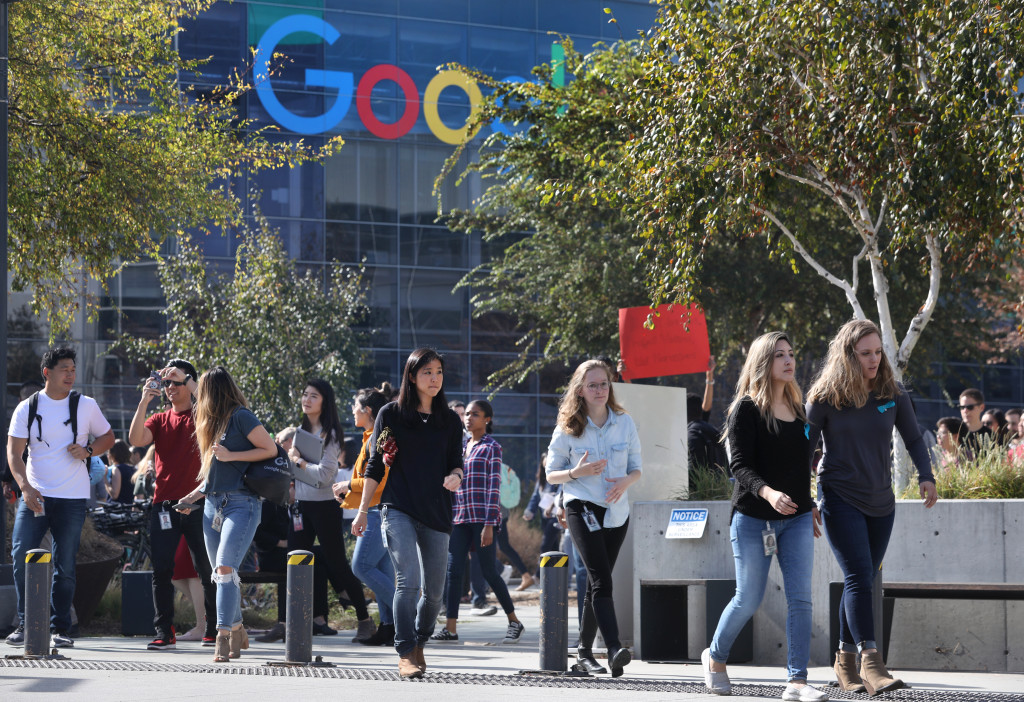More than a dozen shareholder proposals failed as expected at Google’s annual meeting Wednesday, but they raised important questions about the massive company, which has had its share of scandals and controversy over the past year or so.
From ethical questions raised by Google products and contracts to the company’s handling of sexual harassment and treatment of contract workers, Google CEO Sundar Pichai, Chairman John Hennessy and other executives got an earful from disgruntled investors, advocacy groups and employees at the meeting in Sunnyvale while protesters marched outside.
![]() Among the defeated proposals was one that sought a breakup of the company. The presenter of the proposal, a representative of Students for a Free Tibet, urged the company to take steps now “rather than waiting for antitrust regulators to act.” As the internet giant faces possible U.S. antitrust inquiries and calls to break it up, she said the company has “grown to a complexity that is unmanageable.”
Among the defeated proposals was one that sought a breakup of the company. The presenter of the proposal, a representative of Students for a Free Tibet, urged the company to take steps now “rather than waiting for antitrust regulators to act.” As the internet giant faces possible U.S. antitrust inquiries and calls to break it up, she said the company has “grown to a complexity that is unmanageable.”
Another proposal that failed urged the company to study and share an assessment of the human rights implications of Project Dragonfly, Google’s reported plan to once again operate a search engine in China.
“As we’ve said, we have no plans to open a search engine in China,” said Kent Walker, senior vice president for global affairs and chief legal officer for Google, during the meeting’s Q&A session. CEO Sundar Pichai said in a New York Times interview in November, after employees protested — and quit — over the issue, “It’s not even clear to me that search in China is the product we need to do today.”
There were more than a few mentions of recent employee protests and actions during the meeting, including one in November when thousands of workers walked off the job in response to a report of huge payouts to executives accused of sexual misconduct and harassment. A proposal for a clawback policy, in which an executive would be forced to pay the company back in case of misconduct, did not pass, either.
After the proposal to install a non-executive employee representative on the board of directors failed, a Google employee said during the Q&A: “What’s really stuck out to me recently is this shift when we’re challenged,” she said. “I’ve seen executives feign powerlessness as if we’re not a company the size of some countries. We’re told we can’t take dramatic action. When we respond this way it’s disingenuous. We’re choosing to use our power to solve the wrong problems, and we can do better.”
Yolanda Chavez, who spoke at the meeting as a representative of Silicon Valley Rising, expressed concerns about Google’s plan for a giant campus in San Jose.
“Yesterday’s announcement (a $1 billion pledge by the company to help with Bay Area housing) was a positive sign that Google is listening to the community,” she said through a translator. But Chavez noted that the 5,000 in affordable-housing units Pichai mentioned in a blog post as part of the plan are needed in San Jose alone, according to a study she cited. “What’s your plan to mitigate Google’s impact on San Jose?”
Chief Financial Officer Ruth Porat answered that “our announcement really underscores our commitment to Bay Area,” and pointed to other initiatives by the company, including its philanthropic arm Google.org, which she said is working on housing, and in trying to teach digital skills.
One shareholder complained that Alphabet CEO Larry Page wasn’t present. Page and Google co-founder Sergey Brin are seldom seen at public company events.
“Maybe one year he’s sick,” the shareholder said. “But year after year, there’s no CEO here.”
Because of the company’s multi-class stock structure, Page and Brin together have 51 percent of voting shares, a reason shareholder resolutions fail year after year.
But they’re a way to keep putting pressure on Google, which needs it, said Don Heider, executive director of the Markkula Center for Applied Ethics at Santa Clara University.
“There are pockets of Google working on ethics, but not an overarching commitment that’s taking place,” Heider said.
Heider said big tech companies including Google have asked ethicists to talk to them in the past year as they’ve increasingly come under fire, and one member of the center is working half-time with the company to try to help build ethics into the company’s products and designs.
“It has to include the C-suite,” he said. “I want to get CEOs engaged in discussions because I think we can help… the model in Silicon Valley lately is build it, release it, then fix it. We’re saying reconsider that model.”










